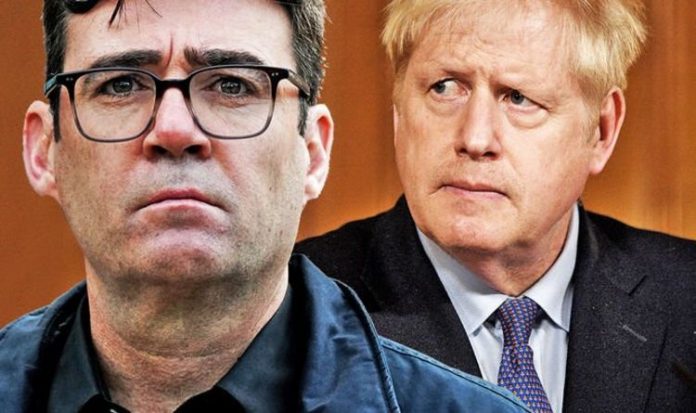Prime Minister Boris Johnson has faced wavering levels of support in recent months due to his handling of the pandemic. His attempts to impose Tier 3 restrictions on Greater Manchester were met with great resistance, particularly from the region’s mayor, Labour’s Andy Burnham. Many of the surrounding regions agreed to enter Tier 3 after discussions with Westminster, but Mr Burnham claimed there was insufficient financial support for Greater Manchester as so many businesses would have to shut under the new strict measures.
He pushed for £90million of support from the Government before backing down to £65million — not far off the £60million the Government had first offered.
Yet, Westminster refused to compromise and Mr Johnson has since waded in to impose Tier 3 anyway after ending talks without a deal.
Although he lost the power struggle, Mr Burnham has undoubtedly attracted attention from the public for his outspoken efforts.
His pushback against Downing Street over the last month may even have shaken the possibility that Mr Johnson could get re-elected for a second term, as their fallout appears to have put Northern England’s faith in the Tories in doubt.
Admittedly, he already had a high public profile due to his time in the cabinet under Gordon Brown — and was Mr Corbyn’s main opponent for the Labour leadership in 2015.
Furthermore, commentator Rosa Prince speculated that Mr Burnham could even have been in Downing Street himself by now, if he had beaten Jeremy Corbyn to the leadership role.
Labour MP Dame Margaret Beckett said it was the “worst mistake of my life” to nominate Jeremy Corbyn to be Labour leader.
Ms Prince wondered, if Ms Beckett had not backed the leftwing MP, “Andy Burnham [might] be halfway through his first term as Prime Minister round about now”.
READ MORE: Boris Johnson warning as fury over Tier 2 inconsistencies rises
However, it is worth pointing out that this theory depends on a fair few factors.
Writing in The Telegraph, she explained: “Had Mr Burnham been leading his party at the time of the 2016 referendum instead of the Eurosceptic Mr Corbyn, might the vote have gone the other way?
“If not, it seems likely that he would have supplanted Theresa May at the 2017 general election, meaning a quite different outcome to the EU negotiations; plus no 2019 general election, no Red Wall turned blue to bolster an 80-seat majority for Boris Johnson.”
She is not the only political commentator to have wondered what other paths Mr Burnham could have taken in his career back when he was at the forefront of the Labour Party.
James Kirkup speculated in The Spectator that Mr Burnham could have shown his “fighting spirit” when he was the Culture Secretary under Gordon Brown back in 2009.
DON’T MISS
Biden’s ‘love letter’ to Irish roots unveiled as trade deal fears grow [INSIGHT]
Brexit deal will ‘come at cost and Boris Johnson will have to pay’ [EXPLAINED]
How Johnson’s new bill risks surge in calls for Welsh independence [EXPOSED]
When the Work and Pensions Secretary James Purnell quit and declared he had no faith in Mr Brown’s premiership, many expected Mr Burnham —Mr Purnell’s close ally and friend — to follow suit.
Yet, No.10 persuaded him to stay, although it is not known how.
Mr Kirkup explained: “What interests me is what might have happened if he’d made the other choice.
“If he’d followed his friend James Purnell over the top, [David] Miliband might well have gone for it [and resigned].”
The commentator wonders if this would have set off a chain of events which would have seen Mr Brown ousted, Mr Miliband as his replacement and Mr Burnham as his Chancellor.
This, in turn, could have seen David Cameron’s Conservatives beaten at the 2010 election.
Although this is all conjecture, there’s no doubt that the surprise standoff Mr Burnham initiated against Mr Johnson will have left some worried faces within Downing Street.
According to Paul Keaveny, writing for The Conversation, Mr Burnham’s recent actions could still have some consequences for Westminster.
He wrote: “The drama could embolden Bunham and other northern leaders to continue to push and challenge the Government on its levelling up agenda.”
The journalist even remarked that Mr Burnham may have still triggered a pivotal change within Westminster.
He added: “Ultimately, Burnham’s argument seems to recognise what’s coming down the tracks, and in time we’ll likely recognise this moment as a major fork in the road for how England’s cities are governed.”







